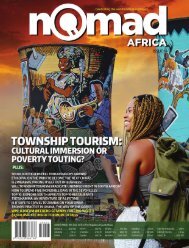Nomad_Africa_Edition12
Born from a passionate desire to dispel the negative perceptions which the world has held of the African Continent, and to replace it with a positive focus, Nomad Africa magazine celebrates life on the African continent. Covering stories from all countries and all cultures, it strives to include unique tourist attractions, business development, technology and investment opportunities as well as looking at the continent's cultural heritage. Nomad Africa inspires and breeds a conscious, knowledgeable generation of visionaries among our own, and influences positive perceptions and appreciation for the true worth of Africa worldwide.
Born from a passionate desire to dispel the negative perceptions which the world has held of the African Continent, and to replace it with a positive focus, Nomad Africa magazine celebrates life on the African continent. Covering stories from all countries and all cultures, it strives to include unique tourist attractions, business development, technology and investment opportunities as well as looking at the continent's cultural heritage. Nomad Africa inspires and breeds a conscious, knowledgeable generation of visionaries among our own, and influences positive perceptions and appreciation for the true worth of Africa worldwide.
You also want an ePaper? Increase the reach of your titles
YUMPU automatically turns print PDFs into web optimized ePapers that Google loves.
Kaunda was a close friend of Yugoslav President Josip<br />
Broz Tito. They were so close that Kaunda built a<br />
house in Lusaka especially for Tito's visits.<br />
leaders at the time that this federation<br />
would place the power in the hands of a<br />
white minority, Kaunda, who had visited<br />
Martin Luther King Jr. in Atlanta, USA, set into<br />
motion a campaign, called Cha-cha-cha<br />
campaign executed through the Zambian<br />
<strong>Africa</strong>n National Congress. It was called<br />
“positive nonviolent action”, a form of civil<br />
disobedience that was designed to protest<br />
and voice the objection of Zambian people<br />
against the idea of a federation on the part<br />
of the British.<br />
The civil disobedience campaign produced<br />
two very important results: the British modified<br />
the federation policy and eventually<br />
discarded it altogether, and secondly, it resulted<br />
in the imprisonment of Kenneth<br />
Kaunda and other militant leaders, but not<br />
without consequences. The incarceration<br />
had as a result that political leaders were elevated<br />
to a status of national heroes in the<br />
eyes of ordinary people.<br />
What followed is the very thing that history<br />
books are made of. From 1960, the status of<br />
Zambia’s national independence movements<br />
were secured, and very importantly,<br />
so too was Kenneth Kaunda’s dominant political<br />
position confirmed within UNIP, the<br />
Kaunda was the second mainland <strong>Africa</strong>n head of state to<br />
allow free multiparty elections and to have relinquished power<br />
when he lost: the first, Mathieu Kérékou of Benin, had done so<br />
in March of that year.<br />
United National Independence Party.<br />
Upon his release from prison by the colonial<br />
government on January 8 1960, Kaunda was<br />
elected as president of the United National<br />
Independence Party (UNIP), which had<br />
been formed in 1959 by Mainza Chona.<br />
1960 proved to be a pivotal year in Zambian<br />
politics, more so for UNIP, which enjoyed<br />
spectacular growth by claiming well over<br />
300 000 members by mid 1960. With such a<br />
widespread and loyal support base, the<br />
colonial power Britain invited Kaunda and<br />
several other UNIP leaders for discussions<br />
on the status of the three colonies to a conference<br />
in London, with the inevitable result<br />
of Britain announcing the formal decolonisation<br />
of Zambia in 1961.<br />
Under the leadership of Kaunda, UNIP was<br />
a political steam train gaining the majority of<br />
seats in the new legislative council when<br />
Zambia’s first elections were held in 1962.<br />
Kaunda’s further negotiation skills came to<br />
the fore when he steered Zambia, through<br />
UNIP, towards final independence from<br />
Britain in 1964 – and thus became Zambia’s<br />
first president.<br />
Post-independence politics proved to be<br />
very exciting and challenging. One cannot<br />
ever forget the negative legacy of a colonial<br />
power and it was up to Kenneth Kaunda<br />
and UNIP to steer the Zambian ship on a<br />
path towards prosperity – no mean feat<br />
since looming tribal issues were a constant<br />
feature within the <strong>Africa</strong>n political landscape<br />
– Zambia being no exception.<br />
INTERPARTY POLITICAL VIOLENCE<br />
1968 marked a year of interparty political vi-<br />
Issue 12 | ...Celebrating the world’s richest continent | www.nomadafricamag.com | 65





